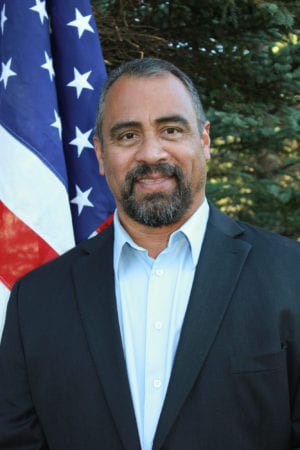
John Cox, a Republican primary candidate for the Alaska Senate, promised to oppose the party’s binding-caucus rule if elected. Cox challenged 17-year incumbent Sen. Gary Stevens in the Republican primary for Senate District P, covering Cordova, Kodiak Island, Homer, Anchor Point, Kasilof, Ninilchik, Yakutat, Seldovia and Tyonek. The primary is scheduled for Aug. 18.
Under the binding-caucus rule, participating legislators are obliged to vote along with the rest of the party on budget issues. Critics of the binding-caucus rule say that it has been used to force conservative legislators into line, undermining their ability to represent their constituents.
“It is such a crime it’s unbelievable,” Cox said. “I will not sign into a binding caucus: that is my promise. I will not give the vote of the people away to this criminal action.”
The Republican Party’s Cordova District passed a resolution condemning the binding-caucus rule at a Jan. 25 meeting, though it has not taken a position on the race between Stevens and Cox.
Stevens defended the binding-caucus rule as a mechanism that has helped legislators reach compromises and avoid being held hostage by a dissenting minority. Abolishing the binding-caucus rule would only make the legislative process more expensive, more time-consuming and more chaotic, he said
Cox, a Navy veteran and entrepreneur, lost the 2018 Alaska House Republican Party primary for District 31 to Sarah Vance by 3.7 percentage points. Cox attributed his relatively narrow loss to a batch of campaign flyers that were delivered too late to go out to absentee voters. Now, due to logistical difficulties posed by the coronavirus pandemic, Cox is campaigning mainly via social media.
“It’s really put a damper on fundraising — going out and shaking hands,” Cox said. “A person is judged by how much money they raise… That’s a crying shame, because money leads to corruption.”
As well as dismantling the binding-caucus rule, Cox will push for term limits on legislators if elected, he said. Though Cox has previously held public positions such as the presidency of the Anchor Point Chamber of Commerce, his time in the Navy best prepared him for the hurly-burly of politics, he said.
“When I first started running, people kept telling me I didn’t have any political experience,” Cox said. “Good God! I served 30 years in the Navy, and anybody who’s been in the military more than one enlistment realizes that once you start to progress in rank it all becomes political.”
The District P Republican primary is Cordova’s only contested party primary. Cox said that would-be candidates were discouraged from running by the knowledge they might be harshly personally criticized in the news media. Cox also blamed the news media for inflaming racial tensions surrounding the Black Lives Matter movement.
“It’s the media that’s lying to the people,” Cox said. “They’re only putting out a narrative that fits their agenda… If a Black cop shoots a White guy, they don’t show that. It’s only the narrative of a White cop killing a Black guy. Now, I understand, in every profession — it doesn’t matter what profession — you’re going to have individuals that are bad seeds … And it is the responsibility of every organization to weed out those bad seeds.”
The upcoming elections to the Alaska Senate may influence redistricting following the 2020 Census, as the state senate majority leader will appoint one of five members to the state’s independent redistricting commission. The candidate filing deadline for the Alaska Senate was June 1. The general election is scheduled for Nov. 3.





